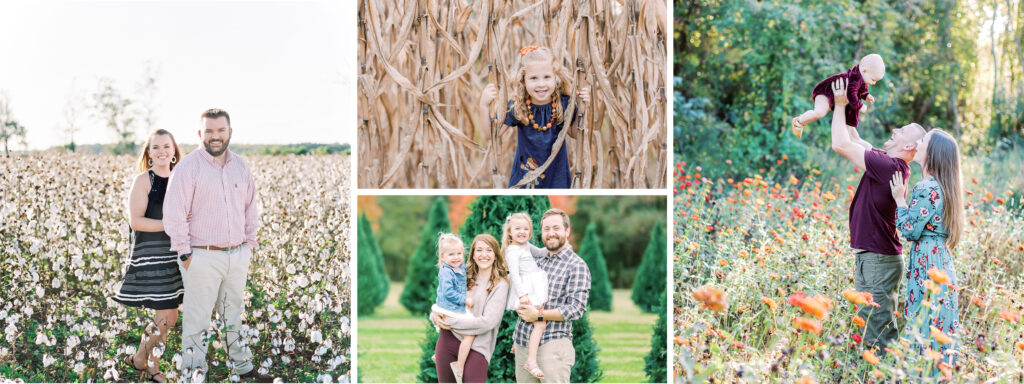Photo Shoots Can Offer New Income for Farmers

Photo Shoots Can Offer New Income for Farmers
Photographers, Farmers Weigh In on What to Consider
By Samantha Day • Photos courtesy Karly Richardson
This story appears in the October 7, 2021 issue of the South Carolina Market Bulletin.
As you’re scrolling through your Facebook or Instagram feed, you may notice a trend: family portraits and graduation photos taken against a beautiful agricultural backdrop. It’s no surprise, given South Carolina’s 4.7 million acres of farmland. The time, care, and dedication farmers put into their land deserves to be seen.
“Fifty percent of my business is through sessions on agricultural land,” says Karly Richardson, a Midlands wedding and portrait photographer.
Farmland offers a lot of benefits to photographers, especially compared to areas like public parks. Agricultural lands are private spaces usually without the distraction of pop-up events and other families. They also tend to be diverse with a variety of crops that can be used as backdrops.
Richardson has held photo sessions on a Christmas tree farm, a wildflower field, a cornfield, and a hayfield. She’s traveled all over South Carolina and even to Atlanta, Georgia, to capture family photos on farms. She also has plans to photograph a lavender farm in North Carolina. When compared to her sessions in a traditional photography studio or park, her sessions on beautiful farms are more popular among her clients.
“Any farmer not taking advantage of the business opportunity with photographers is missing out,” she says. “I am more than willing to pay for this kind of location for photos!”
But with the trend of using farms as backdrops come a few concerns from farmers.
Anyone who opens their land for public use may have concerns about liability and property destruction, especially when their livelihoods are what’s being photographed. But two South Carolina famers say the risk is worth the reward—especially when a waiver is involved!
Michelle Ducworth owns and operates the beautiful Twin Creeks Lavender Farm in Williamston, South Carolina. During the lavender season Twin Creeks offers u-pick weekends that allow families to pick their own bouquets of lavender and shop a selection of lavender-scented products. It’s no surprise that requests to use her farm for family photos, engagement sessions, and bridal portraits have been abundant.
Ducworth describes her rules for regulating professional photography as “something I decided from the very beginning.” Her main concern stemmed from striving for a safe, family-friendly environment.
“Any picture that we use on Instagram or our Facebook page, we get written permission from the family to repost their picture,” Ducworth said. If a photography session and a u-pick event are happening simultaneously, guests might end up in photos without giving permission.
Ducworth also says she doesn’t think photography equipment would be conducive to families picking lavender during her u-pick events.
“Everybody is there for the same reason on the u-pick days, which is to pick lavender, enjoy a day in the country, and enjoy God’s country, and not have to worry about getting in someone’s way of a shot.”
That’s why her lavender fields are open on specific days for photographers only. Private and professional photography sessions can be set up on an hourly basis with a nonrefundable deposit. Ducworth says the photographers she’s worked with are understanding and respect her operation. She does her best to avoid confusing any potential photographers by clearly stating on her website and social media pages that only cellphone photography is allowed.
Tough situations are bound to occur, though. If she had any advice to farmers who are looking to expand their operation, she says, “You just have to create your rules and regulations for your operation and stick to them. Making an exception for one person means making exceptions for all.”
Mellissa and Ernie Williams of Dolce Vita Farm in Eastover, South Carolina, follow a similar structure. Their fields are full of sunflowers and delicious blueberries in the summer and Christmas trees in the winter. Recently, they’ve been looking to open their fields to professional photographers as a second income stream. Melissa Williams hopes this new income stream can “further our farming hobby.” She has begun to get Dolce Vita’s name out there by messaging and calling local photographers, as well as following their social media pages.
Even though she’s just starting out, Williams has a contract in place that releases her farm from all liability to injuries that may occur during a photography session. The contracts also lists areas that are off limits, which include the dock along their pond, and states some basic rules of common courteous for anyone near their farm animals. In the contract, Williams states, “We simply ask that visitors be kind, caring, respectful, and considerate towards our property, people, and animals.”
The farmers are not the only ones who are trying to cover their backs. Richardson said that she has every client sign a contract to protect her and her clients, regardless of what location she is using.
“Contracts are always a good idea because it protects both parties,” Richardson said. “When I’m using a location that isn’t mine (which is 98% of the time), I always provide any rules given to me by the location we’re using and do my best to make sure we follow them” she added.
As to how Richardson makes these connections to hardworking farmers, she says “most of the time I reach out to a farm via the internet if I don’t have a personal connection.” It’s not always that easy, though. She has even tried going door-to-door to find the owners of fields with no luck. This situation is all too familiar to many photographers looking to take advantage of South Carolina’s beautiful landscape. So, if you’re a landowner or farmer and get a knock on your door, answer it – it could be an opportunity knocking.
Like what you see? Subscribe to the Market Bulletin here for just $15 a year.





